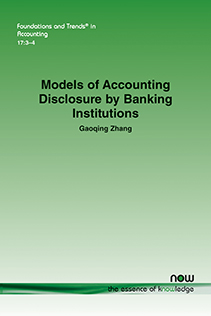Models of Accounting Disclosure by Banking Institutions
By Gaoqing Zhang, Carlson School of Management, University of Minnesota, USA, zhangg@umn.edu
Abstract
In this monograph, I advocate and illustrate an emerging stream of accounting literature that deploys economic models to study issues of accounting disclosure by banking institutions. To motivate the focus on a specific industry (banking), I identify two banking specificities: first, banks are fragile to the risk of runs due to their economic roles in liquidity creation, and second, banks are heavily regulated due to a desire to protect uninformed and dispersed depositors. More importantly, I show that considering these banking specificities, accounting disclosure by banks can play a prominent role in influencing the stability and the efficiency of the banking system. I present workhorse models that can be adapted as building blocks to capture the roles of accounting disclosure in the banking industry. I also draw on recent studies to illustrate specific accounting applications of the workhorse models and discuss their potential to generate implications that inform policy debates and empirical tests.
Models of Accounting Disclosure by Banking Institutions
Models of Accounting Disclosure by Banking Institutions examines an emerging stream of accounting literature that deploys economic models to study issues of accounting disclosure by banking institutions. Motivating the focus on a specific industry are two banking specificities: banks are vulnerable to the risk of runs and banks are heavily regulated. The author shows that considering these banking specificities, accounting disclosure by banks can play a prominent role in influencing the stability and the efficiency of the banking system. Workhorse models are presented that can be adapted as building blocks to capture the roles of accounting disclosure in the banking industry. Recent studies illustrating specific accounting applications of the workhorse models and discussed as to their potential to generate implications that inform policy debates and empirical tests.
